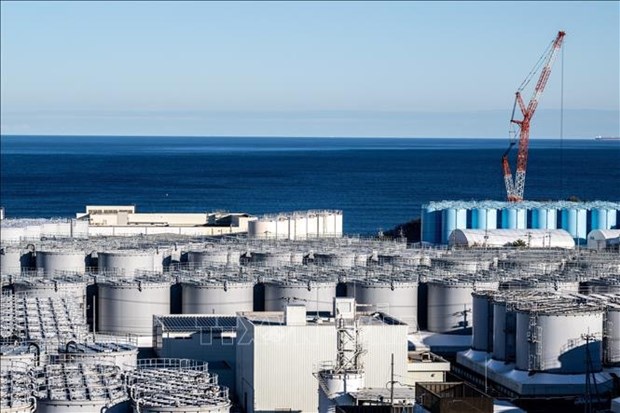ID :
664326
Thu, 07/20/2023 - 08:48
Auther :
Shortlink :
https://oananews.org//node/664326
The shortlink copeid
Japan’s discharge of treated radioactive water to not impact Vietnam: official

Hanoi, July 20 (VNA) – Japan’s discharge of treated radioactive water into the sea will not impact Vietnam’s sea areas, said Deputy Director of the Vietnam Agency for Radiation and Nuclear Safety under the Ministry of Science and Technology Pham Van Toan told the ministry's regular press conference for the second quarter in Hanoi on July 19.
Toan said that on March 11, 2011, an incident occurred at the Fukushima Daiichi nuclear power plant in Japan due to the impact of an earthquake and tsunami, resulting in a large amount of radioactive wastewater. To handle this waste, Japan's discharge plan has been assessed by the International Atomic Energy Agency (IAEA) and leading nuclear safety experts based on the IAEA's safety standards. The experts come from 11 countries, including Dr. Nguyen Hao Quang, former Deputy Director of the Vietnam Atomic Energy Institute.
On July 4, 2023, after more than two years of working, the IAEA officially handed over an assessment report to the Japanese government, concluding that the Japanese government's plan for the discharge of treated wastewater into the sea is consistent with relevant safety standards.
“It should be noted that the total amount of tritium to be released each year in the discharge of Advanced Liquid Processing System (ALPS)-treated water will be well below the amount of these radionuclides produced by natural processes each year, such as interaction of cosmic rays with gases in the upper atmosphere,” the IAEA report said.
According to the report, the concentration of radioactive substances in the water at a distance of 30km from the planned discharge location is very small compared to the natural background radiation level in the seawater and has almost no significant impact on the marine environment in terms of radiation.
Toan said it can be seen that the radiation impact from the discharge is negligible to both people and the environment in Japan. Consequently, this activity will not have any impact on Vietnam's sea areas.
On the occasion, he reiterated the statement made by Vietnamese Foreign Ministry’s spokeswoman Pham Thu Hang in a recent regular press conference that Vietnam supports the development of atomic energy for peaceful purposes. Vietnam believes that the responsibility for ensuring nuclear safety and security lies with the countries using atomic energy. At the same time, Vietnam suggests the need for close international cooperation, transparency in sharing information, responsible behaviour, and compliance with international law in the event of an incident.
Vietnam also emphasises the importance of maintaining peace and stability in the region, protecting the marine environment and maritime resources in accordance with international law, the 1982 United Nations Convention on the Law of the Sea (UNCLOS), and relevant regulations of the IAEA, he said./.





